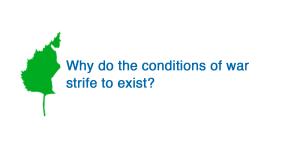The human species has been struggling with how to live together peacefully for over a 2,000 years. On every continent and in every locality there is a story of a war, an uprising, a suppression and the countless numbers of bodies slaughtered and blood spilled in the process of winning or losing. This thirst for war and the spilling of blood shows no signs of slowing or ceasing, and it makes me wonder, “why are we still so primitive?”
Working at the Tavistock Institute of Human Relations, a specialist social science research, consultancy and education practice based in London, this question is very much alive. 2017 marks the 70th Anniversary of the Tavistock Institute of Human Relations, it was founded in 1947 at the end of “the war that was to end all wars”…. One of the key questions that spawned the emergence of the Tavistock institute of Human Relations, was the wish to understand why these conditions of war and strife continue to exist, and what makes countries go to war with each other, and what makes their citizens join in wars that often no one really understands or supports when asked.
The agenda stands and relations between the countries in Europe and wider afield are still dominated by a set of political and tactical manoeuvers that resemble the stories told in the ancient texts of the Muhabarat in India, The Illiad and its narrative of the Trojan Wars in Eurasia. Rather than name all of the wars that have taken place since then, it is simply worth noting that the pursuit of peace has been accompanied by the proliferation of war. And it seems to be a compulsion that goes on repeating itself.

Now, war does not simply manifest on the battle field or need an army of people with weapons, it is possible to contend that our wars are now fought in the mind and through the media. Arguably, the original site of all wars – internal mental states of crisis that are projected out into our three dimensional reality by the fighters. These internal states are so intense that they are denied as being internal and are believed to exist externally as threats to property, culture, identity and ultimately existence. In the face of threats to existence, we are activated in the most primitive ways.
There is an enduring state of mind that is pre-verbal, and culturally located that is beyond the individual desire for peace, and indeed, is located in an area of existence that is beyond the reach of rational thought – this place could be called the unconscious processes that shape our lives. The existence of this realm of unconscious processes, for the purposes of this paper, I suggest, is simply a hypothesis that invites us to “wonder” or reach for a mindset of “inquiry” where we do not know the answers, are uncertain of the questions and are open to there being an emergence of something which could bring us a new, or allow us to access a previously, unthought thought.
This realm of the unconscious processes is not unique or located in the individual, it is a factor or process that belongs to a Group. Wilfred Bion, Indian-born, UK-based psychoanalyst developed his theories after encountering psychoanalysis under Melanie Klein (who was Sigmund Freud’s successor). Bion was trying to understand the most important way to heal wounded soldiers and those who found themselves unable to lead due to stress and anxiety. What is striking, is that Bion advocated a learning modality rather than a healing modality to deal with the leadership difficulties in the soldiers. He said that the men could learn to find themselves a-fresh as a result of their search for meaning in their lives. This access to new meanings allowed them to occupy a new realm and thereby, develop new capacities and express new behaviours.
Our leaders today face a similar challenge. How do they get the learning they need to deal with their anxieties and ailments? How do they find the courage to name the ailments that our corporate leaders face? I suggest that their primary ailment is their position on the battle field and the inability to name the lived experience that all business is WAR, and it is couched in the language of development, growth and value – but that is not often the experience of the leaders.
The turning inward toward this lived experience is a challenge, however, it is often avoided and this avoidance leads to a splitting between the mental model of operation and lived experience of the leader in their field. Likewise the fragmenting of the organisational and developmental opportunities available in the enterprise is simultaneously experienced by the whole workforce to some degree or other. This is arrival of what we refer to as systemic problems – not able to be fixed in any one point, but requires a whole system view.

It is my experience that there is a learning methodology created and evolved over time, that holds the key to understanding why it is so hard for us to move beyond the desire for peace and to actually live peacefully. A learning modality that allows us to move beyond our primitive states in the face of threats, and to understand how the existence of the primitive state in a Group can lead to the mobilisation of individuals. In short a learning modality that allows us to find out about how we take up our authority and lead and follow in our complex adaptive systems – the modern corporation. This is the learning that takes place in a Group Relations Conference, pioneered by the Tavistock Institute of Human Relations.
To find out more about the Group Relations training at the Tavistock Institute of Human Relations or about how systems psychoanalytically-informed thinking can assist in bringing peace to corporate, political or civic life go to www.tavinstitute.org.

